Google AI Introduces Personal Health Agent (PHA): A Multi-Agent Framework that Enables Personalized Interactions to Address Individual Health Needs
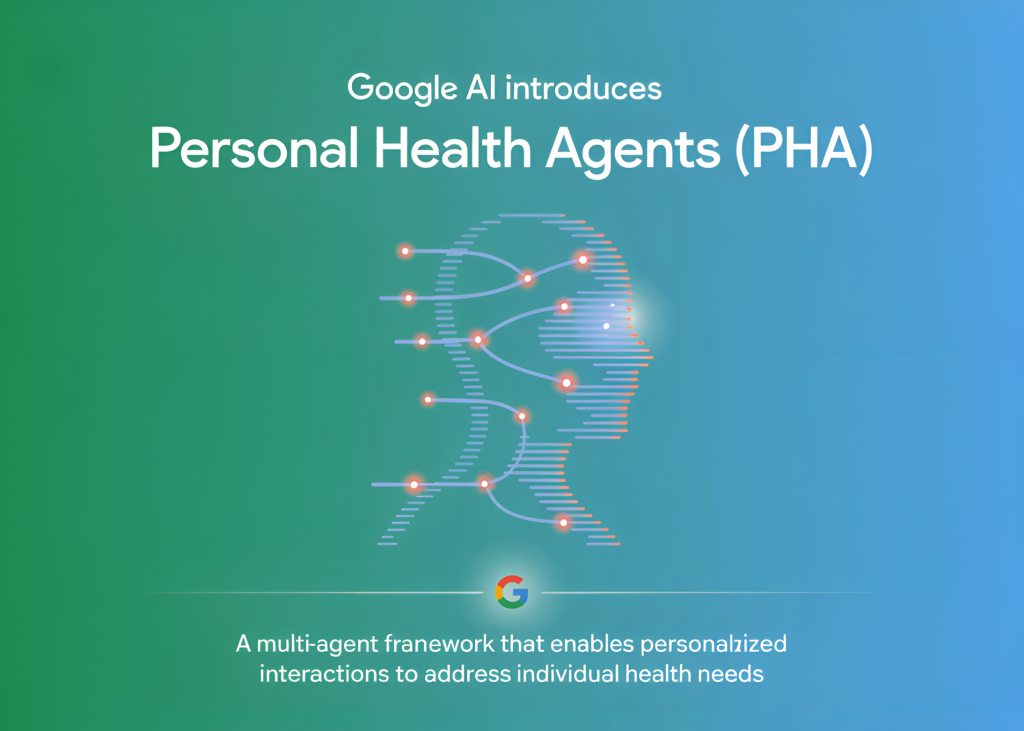
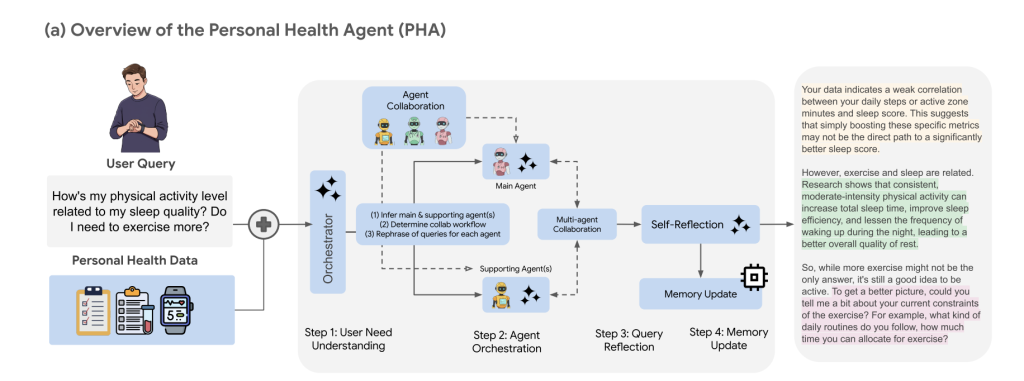
What is a Personal Health Agent?
Large language models (LLMs) have demonstrated strong performance across various domains like clinical reasoning, decision support, and consumer health applications. However, most existing platforms are designed as single-purpose tools, such as symptom checkers, digital coaches, or health information assistants. These approaches often fail to address the complexity of real-world health needs, where individuals require integrated reasoning over wearable streams, personal health records, and laboratory test results.
A team of researchers from Google has proposed a Personal Health Agent (PHA) framework. The PHA is designed as a multi-agent system that unifies complementary roles: data analysis, medical knowledge reasoning, and health coaching. Instead of returning isolated outputs from a single model, the PHA employs a central orchestrator to coordinate specialized sub-agents, iteratively synthesize their outputs, and deliver coherent, personalized guidance.
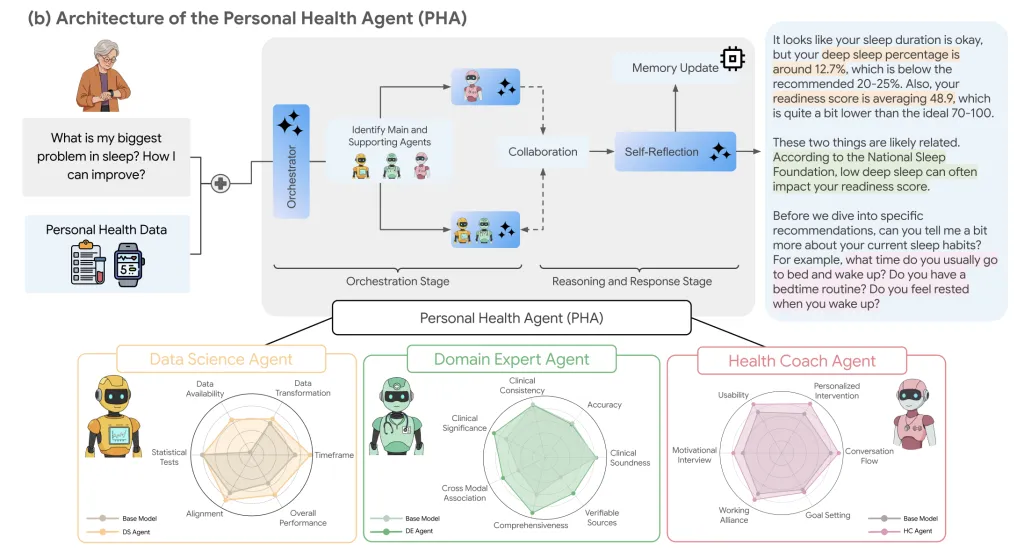

How does the PHA framework operate?
The Personal Health Agent (PHA) is built on top of the Gemini 2.0 model family. It follows a modular architecture consisting of three sub-agents and one orchestrator:
- Data Science Agent (DS)The DS agent interprets and analyzes time-series data from wearables (e.g., step counts, heart rate variability, sleep metrics) and structured health records. It is capable of decomposing open-ended user questions into formal analysis plans, executing statistical reasoning, and comparing results against population-level reference data. For example, it can quantify whether physical activity in the past month is associated with improvements in sleep quality.
- Domain Expert Agent (DE)The DE agent provides medically contextualized information. It integrates personal health records, demographic information, and wearable signals to generate explanations grounded in medical knowledge. Unlike general-purpose LLMs that may produce plausible but unreliable outputs, the DE agent follows an iterative reasoning-investigation-examination loop, combining authoritative medical resources with personal data. This allows it to provide evidence-based interpretations, such as whether a specific blood pressure measurement is within a safe range for an individual with a particular condition.
- Health Coach Agent (HC)The HC agent addresses behavioral change and long-term goal setting. Drawing from established coaching strategies such as motivational interviewing, it conducts multi-turn conversations, identifies user goals, clarifies constraints, and generates structured, personalized plans. For example, it may guide a user through setting a weekly exercise schedule, adapting to individual barriers, and incorporating feedback from progress tracking.
- OrchestratorThe orchestrator coordinates these three agents. When a query is received, it assigns a primary agent responsible for generating the main output and supporting agents to provide contextual data or domain knowledge. After collecting the results, the orchestrator runs an iterative reflection loop, checking outputs for coherence and accuracy before synthesizing them into a single response. This ensures that the final output is not merely an aggregation of agent responses but an integrated recommendation.
How was the PHA evaluated?
The research team conducted one of the most comprehensive evaluations of a health AI system to date. Their evaluation framework involved 10 benchmark tasks, 7,000+ human annotations, and 1,100 hours of assessment from health experts and end-users.
Evaluation of the Data Science Agent
The DS agent was assessed on its ability to generate structured analysis plans and produce correct, executable code. Compared to baseline Gemini models, it demonstrated:
- A significant increase in analysis plan quality, improving mean expert-rated scores from 53.7% to 75.6%.
- A reduction in critical data handling errors from 25.4% to 11.0%.
- An improvement in code pass rates from 58.4% to 75.5% on first attempts, with further gains under iterative self-correction.
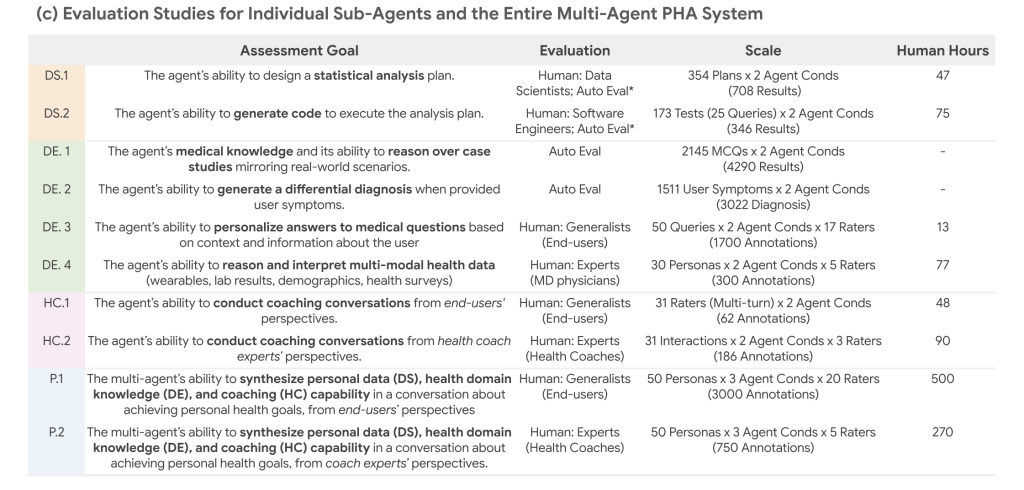

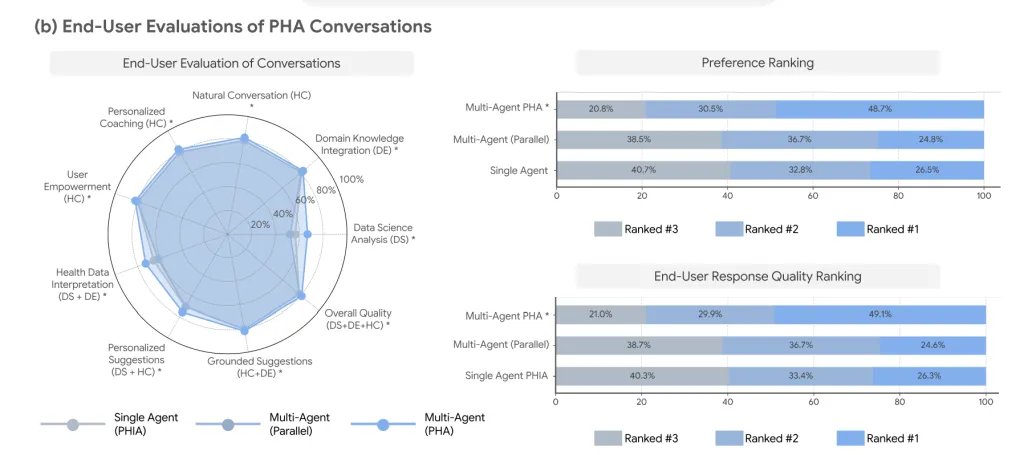

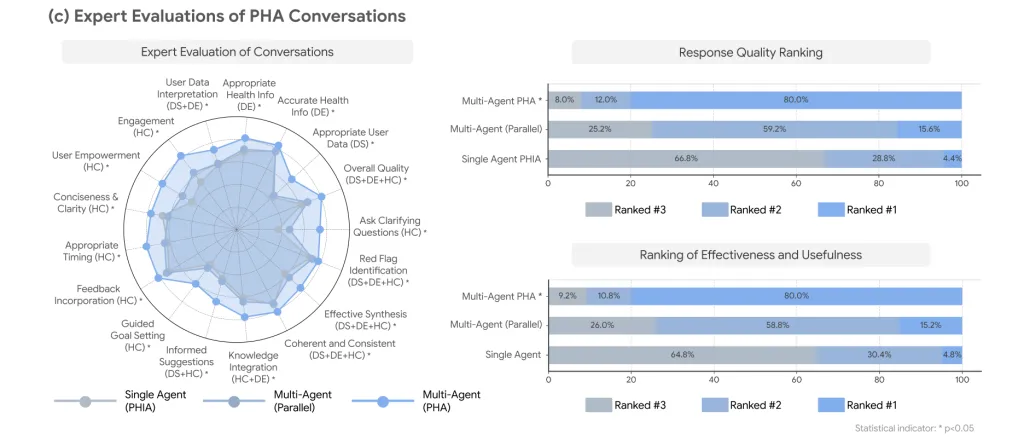

Evaluation of the Domain Expert Agent
The DE agent was benchmarked across four capabilities: factual accuracy, diagnostic reasoning, contextual personalization, and multimodal data synthesis. Results include:
- Factual knowledge: On over 2,000 board-style exam questions across endocrinology, cardiology, sleep medicine, and fitness, the DE agent achieved 83.6% accuracy, outperforming baseline Gemini (81.8%).
- Diagnostic reasoning: On 2,000 self-reported symptom cases, it achieved 46.1% top-1 diagnostic accuracy compared to 41.4% for a state-of-the-art Gemini baseline.
- Personalization: In user studies, 72% of participants preferred DE agent responses to baseline outputs, citing higher trustworthiness and contextual relevance.
- Multimodal synthesis: In expert clinician reviews of health summaries generated from wearable, lab, and survey data, the DE agent’s outputs were rated more clinically significant, comprehensive, and trustworthy than baseline outputs.
Evaluation of the Health Coach Agent
The HC agent was designed and assessed through expert interviews and user studies. Experts emphasized the need for six coaching capabilities: goal identification, active listening, context clarification, empowerment, SMART (Specific, Measurable, Attainable, Relevant, Time-bound) recommendations, and iterative feedback incorporation.
In evaluations, the HC agent demonstrated improved conversation flow and user engagement compared to baseline models. It avoided premature recommendations and instead balanced information gathering with actionable advice, producing outputs more consistent with expert coaching practices.
Evaluation of the Integrated PHA System
At the system level, the orchestrator and three agents were tested together in open-ended, multimodal conversations reflecting realistic health scenarios. Both experts and end-users rated the integrated Personal Health Agent (PHA) significantly higher than baseline Gemini systems across measures of accuracy, coherence, personalization, and trustworthiness.
How does the PHA contribute to health AI?
The introduction of a multi-agent PHA addresses several limitations of existing health AI systems:
- Integration of heterogeneous data: Wearable signals, medical records, and lab test results are analyzed jointly rather than in isolation.
- Division of labor: Each sub-agent specializes in a domain where single monolithic models often underperform, e.g., numerical reasoning for DS, clinical grounding for DE, and behavioral engagement for HC.
- Iterative reflection: The orchestrator’s review cycle reduces inconsistencies that often arise when multiple outputs are simply concatenated.
- Systematic evaluation: Unlike most prior work, which relied on small-scale case studies, the Personal Health Agent (PHA) was validated with a large multimodal dataset (the WEAR-ME study) and extensive expert involvement.
What is the larger significance of Google’s PHA blueprint?
The introduction of Personal Health Agent (PHA) demonstrates that health AI can move beyond single-purpose applications toward modular, orchestrated systems capable of reasoning across multimodal data. It shows that breaking down tasks into specialized sub-agents leads to measurable improvements in robustness, accuracy, and user trust.
It is important to note that this work is a research construct, not a commercial product. The research team emphasized that the PHA design is exploratory and that deployment would require addressing regulatory, privacy, and ethical considerations. Nonetheless, the framework and evaluation results represent a significant advance in the technical foundations of personal health AI.
Conclusion
The Personal Health Agent framework provides a comprehensive design for integrating wearable data, health records, and behavioral coaching through a multi-agent system coordinated by an orchestrator. Its evaluation across 10 benchmarks, using thousands of annotations and expert assessments, shows consistent improvements over baseline LLMs in statistical analysis, medical reasoning, personalization, and coaching interactions.
By structuring health AI as a coordinated system of specialized agents rather than a monolithic model, the PHA demonstrates how accuracy, coherence, and trust can be improved in personal health applications. This work establishes a foundation for further research on agentic health systems and highlights a pathway toward integrated, reliable health reasoning tools.
Check out the PAPER here. Feel free to check out our GitHub Page for Tutorials, Codes and Notebooks. Also, feel free to follow us on Twitter and don’t forget to join our 100k+ ML SubReddit and Subscribe to our Newsletter.
Asif Razzaq is the CEO of Marktechpost Media Inc.. As a visionary entrepreneur and engineer, Asif is committed to harnessing the potential of Artificial Intelligence for social good. His most recent endeavor is the launch of an Artificial Intelligence Media Platform, Marktechpost, which stands out for its in-depth coverage of machine learning and deep learning news that is both technically sound and easily understandable by a wide audience. The platform boasts of over 2 million monthly views, illustrating its popularity among audiences.



